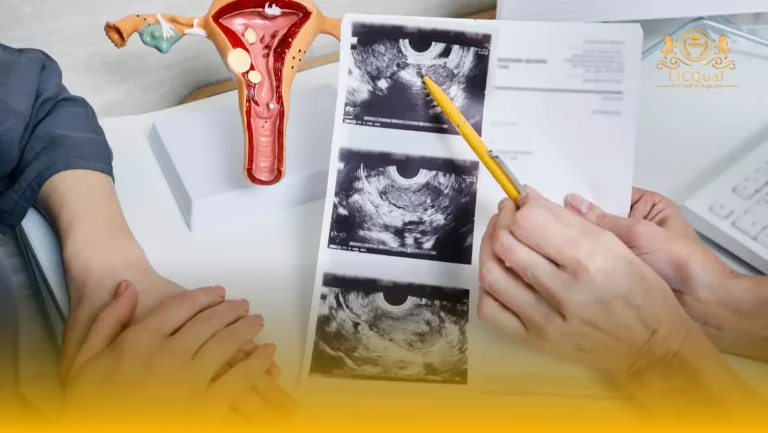The LICQual Level 7 Postgraduate Diploma in Aging and Nutrition (PgD Aging and Nutrition) is a specialized postgraduate qualification designed for professionals seeking to advance their knowledge and expertise in the complex relationship between ageing and nutrition. This programme provides an in-depth understanding of the physiological, nutritional, and health challenges associated with ageing, while equipping learners with advanced skills to design evidence-based strategies that promote healthy ageing and improve quality of life in older populations.
This qualification is not intended for fresh candidates; it is aimed at experienced professionals who are committed to enhancing their career prospects, broadening their expertise, and supporting their Continuing Professional Development (CPD). Learners will explore critical topics such as age-related nutritional requirements, chronic disease management through diet, nutritional interventions for cognitive health, and strategies to address malnutrition in older adults.
The PgD in Aging and Nutrition prepares learners to take on senior roles across healthcare, nutrition, gerontology, and public health sectors. It also develops leadership, critical analysis, and research skills to address the unique nutritional needs of ageing populations at both individual and community levels.
Centres delivering this qualification must employ competent and highly qualified staff, while ensuring access to essential learning materials, up-to-date research, and supportive resources. This guarantees that learners receive high-quality training and are well prepared to contribute effectively in the evolving field of ageing and nutrition.
Course Overview
Qualification Title
LICQual Level 7 Postgraduate Diploma in Aging and Nutrition (PgD Aging and Nutrition)
Total Units
6
Total Credits
120
GLH
600
Qualification #
LICQ2201125
Qualification Specification
To enroll in the LICQual Level 7 Postgraduate Diploma in Aging and Nutrition (PgD Aging and Nutrition), applicants must meet the following criteria:
|
Qualification# |
Unit Title |
Credits |
GLH |
|---|---|---|---|
|
LICQ2201125-1 |
Foundations of Aging and Nutritional Science |
20 |
100 |
|
LICQ2201125-2 |
Nutrition and Chronic Disease Management in Older Adults |
20 |
100 |
|
LICQ2201125-3 |
Cognitive Health, Mental Wellbeing, and Nutrition in Ageing |
20 |
100 |
|
LICQ2201125-4 |
Malnutrition, Frailty, and Nutritional Support in Ageing |
20 |
100 |
|
LICQ2201125-5 |
Research Methods in Aging and Nutrition |
20 |
100 |
|
LICQ2201125-6 |
Leadership and Professional Practice in Geriatric Nutrition |
20 |
100 |
By the end of this course, learners will be able to:
1. Foundations of Aging and Nutritional Science
By the end of this unit, learners will be able to:
- Analyse the biological and physiological changes associated with ageing.
- Assess the impact of ageing on dietary requirements and nutrient absorption.
- Apply nutritional science principles to support healthy ageing and longevity.
2. Nutrition and Chronic Disease Management in Older Adults
By the end of this unit, learners will be able to:
- Evaluate the role of diet in preventing and managing chronic diseases in elderly populations.
- Design evidence-based nutrition strategies for conditions such as diabetes, cardiovascular disease, and osteoporosis.
- Implement practical interventions to improve health outcomes in older adults with chronic illnesses.
3. Cognitive Health, Mental Wellbeing, and Nutrition in Ageing
By the end of this unit, learners will be able to:
- Examine the connection between nutrition, brain health, and cognitive decline in ageing.
- Assess the role of dietary patterns in preventing dementia, Alzheimer’s disease, and depression.
- Propose nutritional approaches to support cognitive health and mental wellbeing in older populations.
4. Malnutrition, Frailty, and Nutritional Support in Ageing
By the end of this unit, learners will be able to:
- Identify risk factors and early indicators of malnutrition and frailty in older adults.
- Develop and apply nutritional assessment tools to diagnose and address undernutrition.
- Recommend clinical nutrition support methods, including supplementation and enteral feeding, to improve elderly health outcomes.
5. Research Methods in Aging and Nutrition
By the end of this unit, learners will be able to:
- Apply advanced research methodologies relevant to nutrition and ageing studies.
- Critically evaluate clinical research, scientific literature, and public health data.
- Design and present a research proposal with strong methodological and ethical foundations in geriatric nutrition.
6. Leadership and Professional Practice in Geriatric Nutrition
By the end of this unit, learners will be able to:
- Demonstrate leadership and effective communication in nutrition and ageing contexts.
- Apply ethical, cultural, and professional frameworks in the provision of elderly nutritional care.
- Integrate critical thinking and professional practice to develop strategies that improve the wellbeing of older populations.
The LICQual Level 7 Postgraduate Diploma in Aging and Nutrition (PgD Aging and Nutrition) is ideal for professionals and graduates who want to specialize in aging and nutrition. It is designed for those seeking practical expertise, advanced knowledge, and career advancement in geriatric health, wellness, and nutrition services.
Nutritionists and Dietitians
- Gain advanced knowledge of aging and nutrition requirements
- Design personalized meal plans for older adults
- Assess nutritional status and manage age-related conditions
- Apply evidence-based strategies for healthy aging
- Enhance professional credibility in geriatric nutrition
- Improve career prospects in clinical, community, and private sectors
Healthcare Professionals
- Integrate nutrition knowledge into elderly care practices
- Advise older adults and caregivers on dietary interventions
- Manage nutrition-related chronic diseases
- Improve patient outcomes with science-based strategies
- Strengthen skills for preventive and therapeutic care
- Enhance professional profile in geriatric healthcare
Wellness and Fitness Experts
- Understand nutrition’s impact on aging and functional health
- Develop programs for healthy aging and weight management
- Apply dietary strategies to improve energy, mobility, and strength
- Support clients in disease prevention and wellness goals
- Integrate nutrition into holistic fitness plans
- Enhance career opportunities in wellness and elderly care
Food Industry Professionals
- Develop nutrition-focused products for older adults
- Ensure compliance with food regulations and safety standards
- Understand market trends for aging populations
- Innovate health-oriented food solutions
- Apply research-driven insights to product development
- Strengthen credibility in functional and specialized foods
Researchers and Practitioners
- Conduct studies in aging and nutrition
- Apply research outcomes to improve elderly health
- Publish findings for evidence-based practice
- Collaborate with healthcare and nutrition experts
- Use advanced tools for nutritional assessment
- Translate knowledge into practical solutions
Entrepreneurs and Business Leaders
- Launch or expand nutrition-focused services or products
- Understand market needs for aging populations
- Apply science-backed strategies to business decisions
- Build credibility as a certified expert in aging nutrition
- Innovate solutions for elderly health and wellness
- Develop programs targeting geriatric nutrition
Graduates Seeking Career Specialization
- Gain practical skills in aging and nutrition
- Apply advanced knowledge directly in the workplace
- Increase employability in healthcare, wellness, and nutrition sectors
- Build recognized expertise without pursuing further degrees
- Stand out as a specialist in geriatric nutrition
- Access diverse career opportunities in clinical, community, and private sectors
Centres approved to deliver the LICQual Level 7 Postgraduate Diploma in Aging and Nutrition (PgD Aging and Nutrition) must ensure high-quality teaching, learning, and assessment in line with international standards. To achieve this, centres are required to provide:
- Qualified and Experienced Staff – Tutors, assessors, and academic mentors must hold postgraduate qualifications in nutrition, gerontology, health sciences, or related fields, alongside professional experience in ageing and nutrition.
- Comprehensive Learning Resources – Centres must give learners access to updated study materials, research journals, case studies, and digital platforms to support independent and advanced study.
- Appropriate Learning Environment – Centres should provide well-equipped classrooms, laboratories (where applicable), and reliable online learning platforms to facilitate both face-to-face and blended learning.
- Robust Assessment and Quality Assurance Systems – Institutions must establish clear processes for learner assessment, internal verification, and continuous monitoring to ensure fairness and academic integrity.
- Learner Support Services – Centres must provide academic guidance, pastoral care, and research support to help learners achieve success in their postgraduate studies.
- Commitment to Quality Standards – Continuous staff training, internal reviews, and adherence to LICQual’s quality assurance framework are essential to maintaining high standards of delivery.
By meeting these requirements, centres ensure that learners enrolled in the PgD Aging and Nutrition receive world-class education and the professional skills necessary to advance in healthcare, nutrition, and gerontology.
Assessment and Verification
All units within this qualification are subject to internal assessment by the approved centre and external verification by LICQual. The qualification follows a criterion-referenced assessment approach, ensuring that learners meet all specified learning outcomes.
To achieve a ‘Pass’ in any unit, learners must provide valid, sufficient, and authentic evidence demonstrating their attainment of all learning outcomes and compliance with the prescribed assessment criteria. The Assessor is responsible for evaluating the evidence and determining whether the learner has successfully met the required standards.
Assessors must maintain a clear and comprehensive audit trail, documenting the basis for their assessment decisions to ensure transparency, consistency, and compliance with quality assurance requirements.







